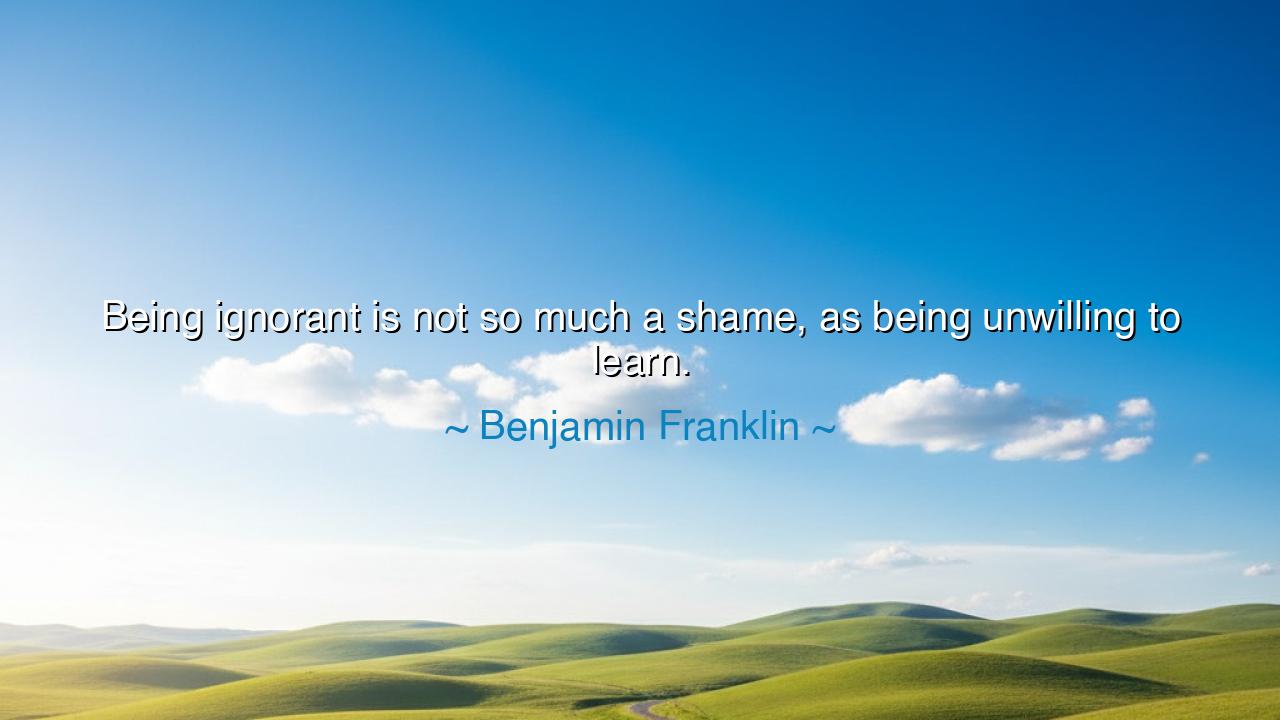
Being ignorant is not so much a shame, as being unwilling to






“Being ignorant is not so much a shame, as being unwilling to learn.” — Thus spoke Benjamin Franklin, the sage of early America, a man whose wisdom was carved not in marble halls but in the furnace of experience. His words are a torch passed down through generations, burning with an eternal truth: that ignorance is not a sin, but stagnation of the soul is. To be ignorant is to be human, for no man is born with knowledge; but to refuse the invitation to learn, to close the mind against growth, is to turn away from the divine gift of understanding itself.
In this saying, Franklin does not condemn ignorance, for he knew that all men begin their journey in darkness. What he condemns is prideful blindness — the heart that will not see, the mind that will not be taught. Knowledge, he believed, is the light by which civilization advances, and learning, the sacred fire that transforms weakness into wisdom. To be ignorant is but a temporary condition; to remain so by choice is to reject the very purpose of our creation — to grow, to seek, and to evolve toward truth.
Franklin himself was born into humble beginnings, with little formal education. Yet his hunger for learning became the compass of his life. As a young apprentice in his brother’s print shop, he devoured every book he could find — philosophy, science, literature, and faith alike. When the world denied him a teacher, he taught himself. By candlelight he studied languages and built inventions, not because he was told to, but because his spirit refused to remain still. And thus, the boy who began as an uneducated printer’s apprentice became one of the wisest men of his age — a statesman, inventor, philosopher, and founding father of nations. Franklin himself was living proof that ignorance is not disgrace, but refusing to learn is defeat.
Through these words, Franklin reveals a timeless law: the wise are not those who know, but those who are willing to learn. The truly great remain students until their final breath. The fool, however, mistakes pride for wisdom and arrogance for truth. The ignorant who seeks knowledge is already wise in spirit, while the learned man who stops seeking becomes ignorant again. For the well of wisdom never runs dry — it is only the cup that grows too full of itself that refuses more water.
History is rich with examples of those who triumphed by embracing this truth. Consider Abraham Lincoln, born in a one-room cabin on the edge of the frontier. He had less than a year of schooling in his entire life, yet he devoured books with a fervor that astonished all who knew him. He borrowed volumes, copied entire passages by hand, and carried lessons in his heart as he worked by firelight. It was not the wealth of his birth but the willingness to learn that raised him to the heights of leadership. And when he faced the storms of war and the divisions of a nation, it was his humility before wisdom — his openness to understanding others — that made him a pillar of strength.
Franklin’s wisdom also speaks to the soul’s moral growth. For the same principle that governs the mind governs the heart: those who are unwilling to learn remain trapped not only in ignorance of fact, but in ignorance of virtue. The man who refuses to listen grows cruel; the one who refuses to reflect becomes hardened. But the one who learns — from his mistakes, from others’ pain, from the quiet lessons of life — becomes wise, compassionate, and strong. The path to wisdom is not found in knowing much, but in being willing to learn from everything.
So, my child, do not fear your ignorance; fear your indifference. Do not be ashamed of what you do not yet know — be ashamed only if you no longer seek to know. Ask questions boldly. Read deeply. Listen humbly. Admit error without pride. Seek teachers not in grand halls alone, but in every person and every experience, for all of life is a classroom to the willing soul. The moment you stop learning, you stop living.
For in the end, Franklin’s words are not merely about education — they are about the spirit of awakening. The one who is willing to learn holds in his hands the power to change himself, and through himself, the world. Knowledge is not inherited; it is pursued. Wisdom is not granted; it is cultivated. And the one who walks through life with an open heart and a humble mind will find that even the simplest truth can set him free. So, remember always: ignorance may be your beginning, but willingness to learn — that is your destiny.






AAdministratorAdministrator
Welcome, honored guests. Please leave a comment, we will respond soon